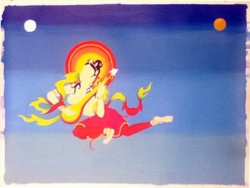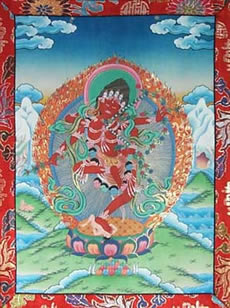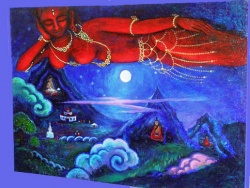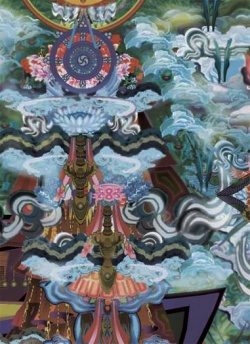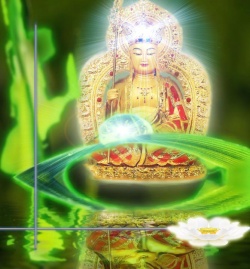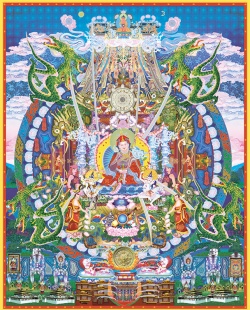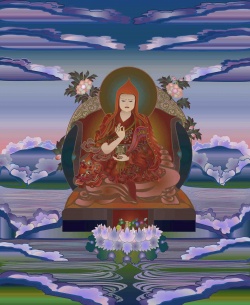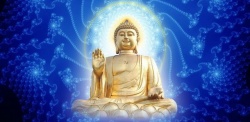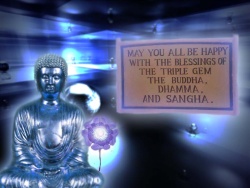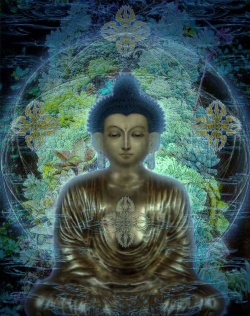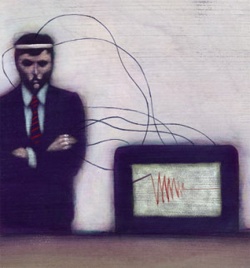East of the Sun and West of the Moon
The ancient philosophers of the West delved into the Nature of the Outer World whereas the ancient sages of the East delved into the Nature of the Inner World. In general terms, after the Dark Ages, Western civilisation took up again the "Outer World Philisophy" of their ancients, and commenced down the long road of mapping out the "Outer World".
Of course, there are notable exceptions to this simplistic representation, but in general principal the following result was obtained:
In progression from concept to concept, Western Science hosted the industrial revolution which is now becoming the techological revolution, where it responsible for all the "modern conveniences" that technology can bring. On the other hand, the teachings of the sages of the East have remained unchallenged through the millenia and remain basically the same as they were in ancient days.
In relation to "Traditional Western Sciences" there are no "official theories" for the nature of mind, as it has never been "officially" observed in any given "Frame of Reference" in the "Outer World". The traditional physical approaches to the problems of defining the nature of consciousness have in the past fallen far short of presenting any form of satisfactory explanations. However there have recently been a gradual emergencence of interdisciplinary scientific conferences, such as those hosted at Tucson. Further information in this area may be obtained in a separate review of the preceedings which have arisen out of these - Towards a Science of Consciousness.
Students of Modern Global Science who are interested in seeking further information concerning the nature of mind are recommended not to disregard the resources which are available from the East, or alternatively from "Non-Scientific Information Resources" (ie: Religious) in the West.
The article below is actually sourced from the first four chapters of the Surangama Sutra and consists of a dialogue between Buddha and a number people who had gathered to hear his speak ...
From the Surangama Sutra ... Buddha at this time was residing at a large meeting hall set in the ancient forests of India at a place called Sravasti where, with a great congregation of people in attendance, he was addressed by Ananda (his main disciple) with the words - beholds the Buddha.
In the ensuing discourse, sessioned some two and a half thousand years ago, the nature and the location of the mind are discussed:
Buddha: "Using what means of sight ... and who was it that beheld me?"
Ananda: "I used my eyes and my mind".
Buddha: "Then the true ground of 'BEHOLDING' is to be sought in the mind and the eye. But what is the precise location of this mind and this sight?"
Ananda: "Everyone agrees that the mind is within the body and the eye is within the head".
Buddha: "You are seated in the preaching hall of Tahagata; look out now and see the trees, and tell me where they are situated."
Ananda: "They are outside the hall".
Buddha: "And as you sit here in the hall, what is it that you first behold"?
Ananda: "First the Tathagata, next the great assembly, then the trees outside".
Buddha: "As you behold the trees outside, what is the medium through which you gaze at them?"
Ananda: "The windows of this great hall are open".
Buddha: "Is it possible for any person within this hall NOT to see the Tathagata, and YET behold objects outside?"
Ananda: "No!"
Buddha: "If the mind is then within the body, it would be acquainted with the inner parts of the body itself. So that all men should be first sensible of ... all that is within them, and afterwards ... those things which are without. But how is it then, that we never meet a man who is able to see his own internal organs? That the mind is located within the body cannot be maintained."
Ananda: "I must then understand that that the mind is without the body. It seems that the intelligent mind (or perceptive faculty) must be like a lamp placed OUTSIDE a house, not illuminating that which is within."
Buddha: Take your assertion that the mind is dwelling outside the body. Therefore there must be an external connection between your body and this mind, and when this personal connection is not in action, then what the external mind perceives you yourself cannot know. And since (as far as you are concerned) the knowledge of a thing is the personal knowledge you posses of it, the intelligent mind (apart from this) knows nothing. For instance, I show you my hand: At the moment your eyes perceive it, does not the mind also perceive it?"
Ananda: "Yes".
Buddha: "Therefore it would appear that the mind is not resident outside the body, in as much as it is disconnected from it".
Ananda: "I must therefore concede that the power of seeing and knowing is fixed in the one place."
Buddha: "But what is that place?"
Ananda: "It appears that the mind, if not within, and yet perceiving that without, lies hidden with the sense itself."
Buddha: "Then why do you not see the eye itself when you gaze upon the mountains? This assertion also cannot be."
Ananda: "In your discourses with the disciples concerning the true condition of being you have said that the intelligent mind is neither within the body nor beyond it, but is between the two."
Buddha: "You speak of between the two. Take care that this phrase does not deceive you, so that it means nowhere. Where is the place of this middle point? Does it reside in the sense or in the thing perceived? If the mind is in the middle of the sense and the object of sense, then the substance of mind is either UNITED with the two, or separated and DISTINCT from the two. If UNITED with the two, then there is a confusion of substance, so mind would not be a substantial unit. But if there be no such union, then this intelligent mind must partake of the character of the sense which you say has the power of knowing, and partly of the object of the sense which you say has no such power. The mind therefore has no distinct character; and if so, by what mark may you recognise it, as it exists in the middle of these two opposing powers? You may conclude that this hypothesis is not capable of proof."
Ananda: "I have heard the assertion that the nature of the mind is such, that it could not be said to be within the body, nor without it, nor in the middle point, but that the mind in its very nature is without a local habitation, and without preference. I would be glad to know whether I may define the mind as that which is "indefinite" and "without partiality".
Buddha stretched out his hand and drew his fingers into a fist and asked Ananda "What do you see?"
Ananda: "I see the Tathagata raising his arm and bending his fingers into a fist."
Buddha: "Now, what is the instrument by which you see all this?"
Ananda: "I and all present see this by the use of our eyes."
Buddha: "If it is your eyes which see the fist, of what account is the mind?" Ananda: "I take it that the mind is the power by which I investigate."
Buddha: "No, no, Ananda, this is not your mind" Ananda: "If this is not my mind, tell me what it may be called."
Buddha: "This is but the perception of vain and false qualities which, under the guise of your true nature, has from the first deceived you."
At this time Buddha began his explanation to Ananda and the rest of the congregation intending to excite in them a consciousness of that mind which springs not from any earthly source...
Buddha: "Tathagatha ever says, every phenomenon that presents itself to our knowledge is but a manifestation of the mind ... which is the true substratem of all.
If all the varieties of being in the collection of worlds, down to the single shrub, and the leaf, or the fiber of the plant, tracing all these to their ultimate elements-if all these have a distinct and substantial nature of their own-how much more or the pure, excellent, and human mind, which is the basis of all knowledge, to have attributed to it its own essential and substantial existence?
If, you examine this question and still prefer to call the discriminating and enquiring faculty by the name of mind, you must at any rate distinguish it from the power that apprehends the various phenomenon connected with the mere senses and allow the latter a distinct nature.
Thus, while you now hear me declaring the law, it is because of the sounds you hear that there is a discriminating process within you.; yet, after all sounds have disappeared, there still continues a process of thought within, in which memory acts a principal element, so that there is a mind acting as it were on the mere shadows of things.
I do not forbid you to hold your own opinion on the question of the mind, but I only ask you to search out the ... question itself.
If, after you have removed the immediate cause of sensation, there is still a discriminative power in the faculty of which we speak, then that is the true mind which you justly designate as yours; but if the discriminative power ceases to exist after the immediate cause which called it in to exercise is removed, then this power is only a shadowy idea, dependent entirely on the external phenomenon.
Suppose you were going along a road, and you were to meet a blind man, and ask him 'Do you see anything?' That blind man would reply to you: 'I see only darkness before my eyes'. What is wanting why this observation should not be called "seeing?"
Ananda: "How can you speak of an act of "seeing" when the same darkness is before the eyes of all blind people".
Buddha: "All blind people without can only observe darkness; but now take a man who has eyes, and place him in a dark room, is there any difference between the darkness which the blind man observes and the darkness which the man sees who has eyes".
Ananda: "No. They are the same".
Buddha: "Suppose the blind man who observes only darkness were suddenly to receive his sight - so that he could perfectly see the various objects before his eyes - this you would call 'eye-seeing'. Now, suppose that other man who is in a dark room, and who sees nothing before but darkness, were suddenly to have a lighted lamp brought into the room so that he got perfect knowledge of surrounding objects, would you call this 'lamp-seeing'? "If so, then the lamp is able to see; but, if the lamp is the same as the eye, why do you call it a lamp? And again, since the lamp would then have the power of observation, what value would your eye have in the matter? You know that the lamp is only able to make things visible so that, as far as seeing is concerned, the eyes have distinct function, opposed to the function of the lamp.
But nevertheless when we speak of the 'power of sight', in truth this no more resides in the eye than in the lamp.
At this time, Buddha in the midst of the great assembly, opened and closed his hand and then addressed Ananda saying "What is it that you have seen me do?"
Ananda: 'I saw your palm in the midst of the assembly opened and closed"
Buddha: "When you saw this, was it my hand you saw open and shut, or was it your sight that opened and closed itself?"
Ananda: "It was your hand that opened and closed, for the nature of my seeing faculty admits not opening or closing"
Buddha: "What is it that moves and what is it that rests in this case?"
Ananda: "It was your hand that moved and my seeing faculty is eminently fixed what is there that can unsettle it?"
Buddha: "Just so"... and from the midst of his hand let fly a glorious ray of light which located itself to the right of Ananda, who turned his head and looked over his right shoulder. . Again, Buddha let fly another ray, which fixed itself to the left of Ananda, who turned his head and looked over his left shoulder.
Buddha said to Ananda: "Why did you just now turn your head"
Ananda: "Because I saw light issuing from the precious hand of Buddha and fix itself to the left and right of me, I therefore turned my head to see those lights"
Buddha: "Was it your head which moved, or your sight which moved?"
Ananda: "It was my head which turned, my power of sight is fixed. What then can it move?"
Buddha: "Just so."
At this time, Prasenadjit Rajah rose from his seat and addressed Buddha: "Tell me, how I may attain the knowledge of the imperishable principle which you call the mind?"
Buddha: "Maharajah! with respect to your present body, I would ask you, Is this body of yours like the diamond, unchangeable in its appearance and ... imperishable, or is it, on the other hand, changeable and perishable"
TheRajah: "This body of mine without doubt, in the end, after various changes, will perish"
Buddha: "You have not yet experienced this destruction of the body. How then do you know anything about it?"
TheRajah: "With respect to this transient changeable and perishable body, although I have not yet experience the destruction of which I speak, I observe the case of things around me and ever reflect that all these things are changing - old things die and new things succeed, there is nothing that changes not, thus the wood that now burns will soon be converted into ashes; all things gradually exhaust themselves and die away; there is no cessation of this dying out and perishing. I may certainly know that this body of mine will finally perish ..."
Buddha: "You confess that from witnessing these ceasless changes you arrive at the conviction that your body must perish. Let me ask when this time for your body to perish arrives, are you aware of anything connected to yourself that will not perish?"
TheRajah: "I know of no such imperishable thing"
Buddha: "I will now explain to you the character of that 'nature' which admits of neither birth or death. Maharajah: When you were a little child, how old were you when you fist saw the river Ganges?"
TheRajah: "When I was three years old"
Buddha: "Let us take up your own illustration respecting your gradual alteration of appearance through every decade of your life. You say that three years of age that you saw this river. Tell me then when you were thirteen years old what sort of appearance had this river then?"
TheRajah: "Just the same as it had been when I was three years old; And now I am sixty two there is no alteration in its appearance"
Buddha: "You are now become decrepit, white-haired and wrinkled in face, and so your face has grown during succesive years, tell me then, has the sight which enable you to see the Ganges in former years become also wrinkled and increasingly so with your years?"
TheRajah: "No"
Buddha: "Although your face has become wrinkled, yet your power of sight has in its nature altered not. But that which becomes old and decrepit is in its nature changeable, and that which does not become so, is unchangeable. That which changes is capable of destruction, but that which changes not, must be from its origin incapable of birth or death"
Ananda: "If this sight power is the same as my mysterious nature, then this nature of mine ought to be clear to me; and if this sight power is the same as my true nature, then what is my mind and what is my body?"
Buddha: "Suppose that in the exercise of this vision, you are observing things around you, tell me in what does the SELF of this power consist. Is it due to the bright light of the sun? Is it attibutable to the presence of darkness? Is it the existence of space which constitutes the ground work of its SELF? Or is it the presence of obstacles that constitutes this self?"
If the bright presence of light is the ground work, then, as this presence is the substantial basis of vison, what can be the meaning of seeing 'darkness'? If space is the basis of this self caused power, then, how can there be such a thing as an interpretation of sight by any obstacle? Or if any of the various accidents of darkness be considered as the substantial basis of the SELF, then, in the daylight the power of seeing light ought to disappear...
You should be satisfied therefore, that this subtle power of sight, essentially glorious, depends not for its existence, either on cause or connection. It is not what is termed self caused, nor yet is it the opposite of this. It is independent of all conditions and also of all phenomenon...
Therefore Ananda, you ought to know that when you see the light, the seeing does not depend on the light; when you see the darkness, the seeing does not depend on the darkness; when you see space, the seeing is not concerned with the idea of space; and so also with the limitations of space.
These four deductions being settled, then I proceed to say that when we exercise the power of sight through the medium of this very sight-power seeing does not depend on this sight-power. Even while 'seeing' we may be still at a distance from 'true sight'. Nor by the exercise of sight do we necessarily exercise the power of 'true sight'....
Ananda, consider a man whose afflicted with a cataract. At night, when the light of the lamp shines before him, he thinks he sees a round shadow encircling the flame, composed of the five colours interlacing one another.
What think you with regard to the perception of this round effulgence encircling the flame of the night lamp. Is the beautiful colour in the lamp, or is it in the eye? If it is in the lamp, then why does not a man whose sight is healthy see it? If it is in the sight of the person then, as it is the result of an act of vision, what name shall we give to the power that produces these colours?
We conclude therefore that the object looked at that, ie: the flame, is dependent on the lamp, but that the circle is the result of imperfect vision. Now all such vision is connected with disease. However to see the cause of the disease (the cataract) is curative of the disease...
So, just what you and other creatures see now, the mountains, rivers, countries and lands, all this, I say, is the result of an original fault of sight... of the cataract, as it were, on the true and ever-glorious power of sight which I possess.
If this ordinary power of sight be a cataract on the eye of my true sight, it follows that the pure and bright mind of my true knowledge in seeing all these unreal associations is not afflicted with this imperfection; that which understands error is not itself in error; so that, having laid hold of this true idea of sight, there will be no further meaning in such expressions 'hearing by the ears' or 'knowing by the sight'.
This faculty then, which we an all the twelve species of creatures possess, and which we call sight - this is the same as the cataract on the eye - it is the imperfection of 'true sight': but that true and original power of vision which has become thus perverted, and is in its nature without imperfection - that cannot properly be called by the same name...
At this time, attentive to the words of the Buddha Tathagata, Ananda and all the congregation obtained illumination. The great assembly perceived that each one's mind was co-extensive with the universe, seeing clearly the empty character of the universe as plainly as a leaf, and that all things in the universe are all alike merely the excellently bright and primeval mind of Buddha, and that this mind is universally diffused, and comprehends all things within itself.
And still reflecting, they beheld their generated bodies, as so many grains of dust in the wide expanse of the universal void, now safe, now lost; or as a bubble of the sea, sprung from nothing and born to be destroyed. But their perfect and independent soul (they beheld) as not to be destroyed, but remaining ever the same;
It is identical with the substance of Buddha.
Buddha: "This unity alone in the world is boundless in its reality, and being boundless is yet one.
Though in small things, yet it is in great.
Though in great things, yet it is in small.
Pervading all things, present in every minutest hair, and yet including the infinite worlds in its embrace;
enthroned in the minutest particle of dust, and yet turning the Great Wheel of the Law;
opposed to all sensible phenomena; it is one with Divine Knowledge.
